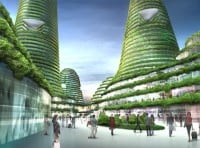BUSINESS – THE ENGINE FOR SMART CITIES OF THE FUTURE

Partnerships drive great service and green cities
- Dateline
- 3 December 2021
Remember the days when towns and cities were ‘owned’ and poorly managed by municipalities and local governments? Days of indifferent service, disinterested officials and disillusioned ratepayers?
It’s all starting to change – thanks to the first smart high-tech partnerships between business and local government, resulting in the birth of the first super-cities built on intelligent grids, driven by green principles and underpinned by a deep service ethic – and, most importantly, co-owned and managed by business.
A decade ago ratepayers were glumly accustomed to call centers that did not answer calls, regular breakdowns of facilities and declining service levels from their towns and cities. This started to change as connectivity moved power into the hands of wired individuals, and council workers found they had no place to hide.
But the real change came after the financial crash of 2008 when the first major cities – Hong Kong, London, Mumbai, San Francisco, Shanghai and Seoul were the leaders – realized they simply could not afford to run their infrastructures the way they had in the past. The money was simply not there to cope with the demands of rapidly growing populations with different demands, and the need to replace aging infrastructure.
The first brave local governments took a deep breath and admitted what their public had known for generations – that governments are not very good at running things. They accepted that the role of really efficient government was to create the platform – and then step back and let business drive it.
Companies like Cisco, Microsoft, Google and Wipro saw the opportunity to reinvent themselves. Indeed, they had to, as they faced intense competition from a host of new enterprises. The new players quickly stepped into the breach, developing a wide range of high-tech solutions at risk. Their bet has paid off.
Today the new co-owned cities run smoothly like corporations on low-cost, highly efficient smart grids that control everything from traffic to power distribution to waste – and business manages and owns these utilities, in partnership with local governments. “Finally government is getting the picture – set the framework and get out of the way,” said urban designer Kwan Lee Kan.
Links to related stories
- Anatomy of a smart city - SmartPlanet, 30 November 2010
- MindBullet: 'BIOLOGICAL' BUILDINGS BLOOM (Dateline: 10 August 2018, Published: 12 August 2010)
- MindBullet: SKYSCRAPER FARMS SOLVE URBAN FOOD SUPPLY CHAIN (Dateline: 1 May 2030, Published: 25 October 2007)
- Leading digital cities - SmartPlanet blog, 30 November 2010
- MindBullet: THE NEW ECONOMIC WAR: CITY VS CITY (Dateline: 14 January 2015, Published: 31 July 2008)
Warning: Hazardous thinking at work
Despite appearances to the contrary, Futureworld cannot and does not predict the future. Our Mindbullets scenarios are fictitious and designed purely to explore possible futures, challenge and stimulate strategic thinking. Use these at your own risk. Any reference to actual people, entities or events is entirely allegorical. Copyright Futureworld International Limited. Reproduction or distribution permitted only with recognition of Copyright and the inclusion of this disclaimer.